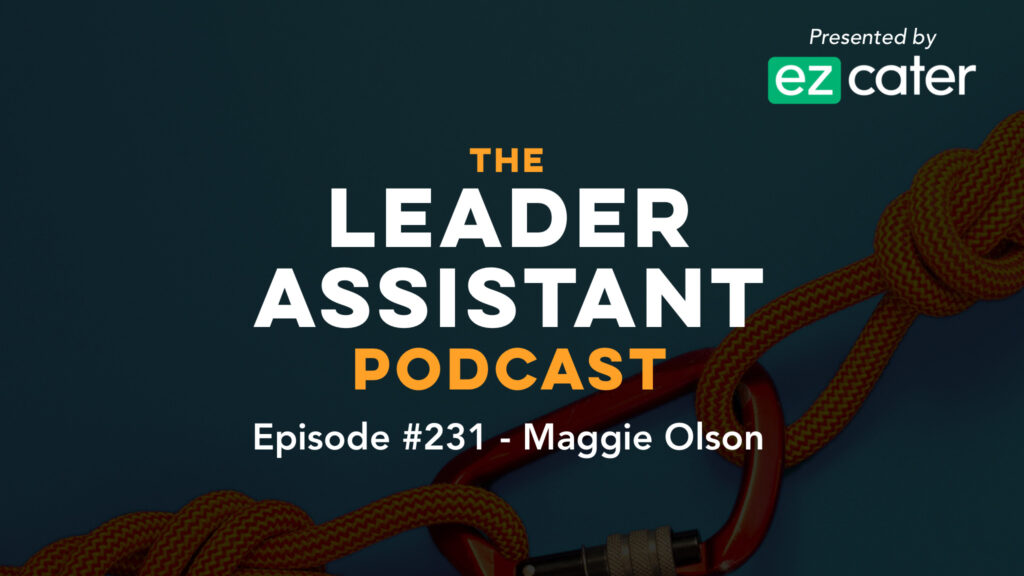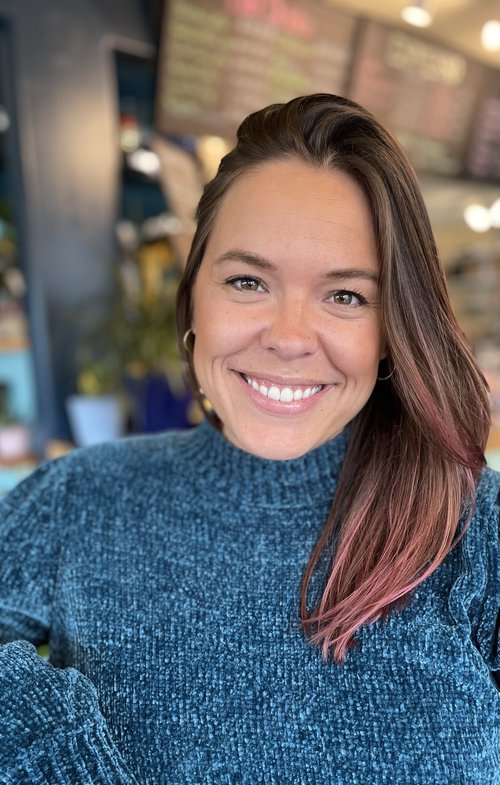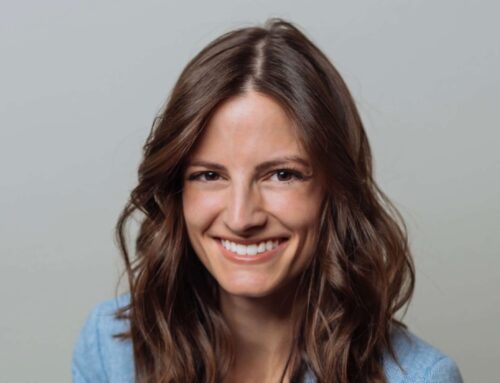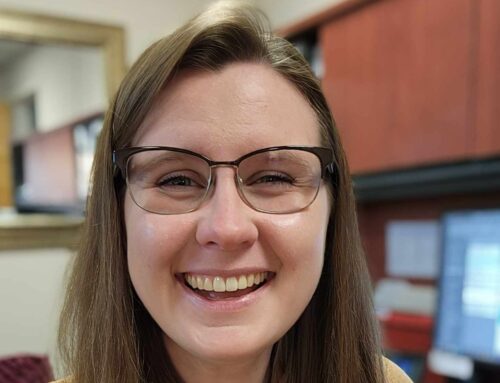Maggie Olson has extensive experience at some of the biggest companies in retail, food & beverage, and technology. She recently was Chief of Staff to the President of T-Mobile’s business group.
In this episode of The Leader Assistant Podcast with Jeremy Burrows, Maggie shares a bit about her experience as a Chief of Staff and walks us through her new course, the Chief of Staff Certification.
LEADERSHIP QUOTE
People will forget what you said, people will forget what you did, but people will never forget how you made them feel.
– Maya Angelou
CONNECT WITH MAGGIE
ABOUT MAGGIE
With extensive experience at some of the biggest companies in retail, food & beverage, and technology, Maggie Olson has stepped into new roles, new industries, and new businesses and transformed teams from the ground up over and over again.
Imagine building a team, becoming a trusted leader, creating new processes, driving efficiency, and growing successful businesses all in less than a year. With the unique ability to walk into an unfamiliar business, quickly learn and assess how to improve the team and execute lasting changes, this is exactly what Maggie has been doing year after year throughout her career.
Maggie’s versatility and strong orientation for action is unique. Her ability to quickly develop sound but flexible business processes and systems enables teams to scale at a rapid pace, and her executive presence offers leaders confidence and trust. Maggie’s approach is upbeat, curious, collaborative, and culture-first. Her solid business acumen, unwavering curiosity, and genuine passion for employee culture provide her the ability to fill any gaps necessary for a team’s success, and with over two decades of experience leading teams across varying industries and businesses, she has a wealth of tools, resources, and experiences to draw from.
In her most recent corporate role working as Chief of Staff leader to the President of a Fortune 40 company — a multibillion-dollar business with 5,000+ employees — Maggie built the president’s Chief of Staff model from the ground up. In doing so, she created a highly successful team, drove major organizational efficiencies, and implemented executive back office process and structure that will be in place for years to come.
–––
THE LEADER ASSISTANT PODCAST IS PRESENTED BY EZCATER
ezCater is the nation’s most trusted provider of corporate food solutions — the best way for companies to order food for daily employee lunches, meetings, and events of any size or budget. ezCater’s simple-to-use platform provides a network of over 100,000 restaurants nationwide, business-grade reliability, food spend management tools, and 24/7 support from their highly trained customer service team.
To explore corporate food solutions or place a catering order, visit ezcater.com.
–––
THE LEADER ASSISTANT PREMIUM MEMBERSHIP
To learn more about how you can join growth-minded Leader Assistants, check out our Leader Assistant Premium Membership for ongoing training, coaching, and community.
THE LEADER ASSISTANT BOOK
Download the first 3 chapters of The Leader Assistant: Four Pillars of Game-Changing Assistant for FREE here or buy it on Amazon and listen to the audiobook on Audible. Also, check out the companion study guide, The Leader Assistant Workbook, to dig deeper.
LEADER ASSISTANT LIVE EVENTS
Check out our constantly updated schedule of events for admins and assistants at LeaderAssistantLive.com.
JOIN THE FREE COMMUNITY
Join the Leader Assistant Global Community for bonus content, job opportunities, and to network with other assistants who are committed to becoming leaders!
SUBSCRIBE
Subscribe to The Leader Assistant Podcast so you don’t miss new episodes!
You can find the show on Apple Podcasts, Spotify, Google Podcasts, Pandora, and Stitcher.
Join my email list here if you want to get an email when a new episode goes live.
LEAVE A REVIEW
If you’re enjoying the podcast, please take 2 minutes to rate and review the show on Apple Podcasts here. Each review helps me stay motivated to keep the show going!
—
EPISODE TRANSCRIPT
Maggie Olson 0:00
Hey there, my name is Maggie Olson and today’s leadership quote comes from Maya Angelou and says, people will forget what you said people will forget what you did but people will never forget how you made them feel.
Podcast Intro 0:21
The Leader Assistant Podcast exists to encourage and challenge assistants to become confident game changing leader assistants
Jeremy Burrows 0:36
are you tasked with ordering food for your office? Let me tell you about ezCater with over 100,000 restaurants to choose from nationwide and a 24/7 customer support. EzCater helps assistants like you and me succeed at work and makes our lives easier. Visit ezcater.com/leaderassistant to find out more. Hey friends, welcome to The Leader Assistant Podcast. It’s your host Jeremy Burrows and welcome to episode 231. You can check out the show notes at leaderassistant.com/231 Leaderassistant.com/231. Today I’m very excited to be speaking with Maggie Olson. Maggie is the owner of Negi Olsen consulting. She’s a fractional chief of staff. And we’re going to talk all about her career and her chief of staff certification program. So Maggie, first of all, welcome to the show. And what part of the world are you in?
Maggie Olson 1:40
Thank you so much. I’m so excited to be here. I am in Lincoln, Nebraska. I moved here about a year ago. So I’m still getting used to it. Born and raised in Seattle, Washington.
Jeremy Burrows 1:50
Oh, Seattle to Nebraska. That is definitely a transition. What made you move that? Let’s see, I guess I could say dramatic of a change.
Maggie Olson 2:00
It has been very dramatic. Probably the combination of a baby and my husband’s family living in Lincoln. And he’s a he’s a hometown, small town news anchor here. So it’s kind of a cool place to be with people who love the news and where my husband grew up. So yeah, it’s been fun being back here, but definitely an adjustment.
Jeremy Burrows 2:23
Wow. That’s great. Well, and that’s not that far from Kansas City, Missouri where I am. So I just hop skip and a throw away. But yeah, glad to have you on the show. So you’re married. You said, kid, do you have hobbies pets? Was something else interesting about you personally.
Maggie Olson 2:41
Yeah, so just had the baby in January. So he’s a little over five months old, which has been super fun first kid, maybe the only one so we’re trying to soak that in. Before the baby. We had a different baby a dog baby. Our poor puppy doesn’t get quite as much love now, but he’s still very loved Luca little rat terrier chihuahua mix very loyal, a little neurotic. We have a 17 year old cat who recently escaped and we found her and she’s on another life now. Her name is Gigi. And other than that, um, love being outside and trying to figure out how to do that in this Midwest heat. But um, yeah, yeah, things Things are good.
Jeremy Burrows 3:25
That’s awesome. So tell us a little bit about your career, then what was maybe your first job? And then how did the journey go from there to Bing, you know, recently chief of staff to the president of T Mobile.
Maggie Olson 3:43
Yeah, wow. I have not reflected on my first job in a long time. And I feel like one of those people that it’s like, hard to think what was my first job because I was working forever. First job was probably pretty boring working at the University of Washington, my parents, my parents are both divorced and remarried and all four of them and for many years, worked at the University of Washington. So I was in filing answering phones for several of their departments as a kid and then Starbucks was probably the more like, real first job. For me where I was a barista. Maybe it 16 ish.
Jeremy Burrows 4:21
So, of course, being Seattle working in Starbucks, yeah.
Maggie Olson 4:30
I loved it, though. Yeah, it was great. My first foray into the world of tips. So from there I had a lot many years really through kind of my young adulthood working in the food and beverage industry. And we talked a little bit before the podcast started here about athletics. I was a volleyball player for a long time. I think you learned a lot of lessons playing sports, that translate pretty strongly into the business world and working with people and leading people and I loved working in food and beverage and talking to people every day and you know, helping people’s experience be really strong and wherever they were at. So I worked for some resorts Salish Lodge and Katy lodge back in Seattle, if you’re if anyone listening is local, but yeah, was able to get leadership experience at a really young age through managing some of those food and beverage outlets, restaurants, coffee shops, all of that. And then worked through some career changes. I found myself at Nordstrom in my mid 20s, as a assistant buyer, and then a buyer, I was kind of always on the planning side. So technically, technically, by planning where you kind of have a relationship with the buyer, there’s a buyer and a planner that lead a department that manages this multimillion dollar budget and buys for example, handbags. And you have a team of assistants and replenishment buyers, then lots of things. And you’re basically running a small business in within Nordstrom in that way. So I had a several years doing that. And then I found myself back at school. So I had an undergraduate degree in economics from Central Washington University, played volleyball there. And then I went back to school after working for a while to an evening MBA program at the University of Washington in their Foster School of Business. So out of there, I’d had a lot of that early leadership experience. And I ended up connecting with T Mobile through my I guess there’s some of the MBA recruiting processes. And they were looking for early career leaders who had aspirations of executive team. I ended up joining T Mobile in their executive rotational program that’s now kind of cease to exist after the sprint merger, they restructured a few things. But that’s how I got a lot of great experience, you know, up to and including the transition to T Mobile.
Jeremy Burrows 7:01
Wow. So had you ever heard of the role chief of staff earlier in your career? And how did you land with that specific title?
Maggie Olson 7:11
I had not heard of the role chief of staff, and we’ll get into this, but this is a big reason why I created the chief of staff certification course, if I would have learned about the chief of staff role in business school, I would have been like, perfect done. That’s what I want to do. I’d never heard about it. And the other thing in business school, I was constantly told to specialize. What do you want to do? Is it marketing? Is it finance is it accounting? What kind of marketing, you know, specialized, specialized, and that just didn’t feel right. For me, I feel like I’m, you know, I like a lot of different things. I like breadth of work. And I’m good at a lot of different things. So I didn’t, it just didn’t jive with me. So anyway, AT T Mobile, I ended up managing a number of stores in the Salt Lake City area, then coming back to Seattle, and working with the retail strategy team and launching some new stores. And then I heard through connections AT T Mobile that the executive that I ended up working for was looking for his first chief of staff. And I figured out by then through some conversations with other chiefs of staff that my skill set would probably be well suited to a chief of staff. And we can talk about that later. But I ended up getting the job and was tasked to build out his chief of staff team. And that’s really my that was my exposure to the chief of staff world.
Jeremy Burrows 8:31
Wow. So tell us about that team, then like who was on the chief of staff team.
Maggie Olson 8:36
So originally, it was just me. And then I was given the autonomy and freedom and task to really build out the team and the resources for what I believed and the executive I was supporting, believed the team needed. So that really ranged from business planning, engagement, so like, what is the executive a part of how is he showing up and talking about his business externally or talking about external things that he’s involved with internally, that goes hand in hand with events and communications? Then there’s a big part that I kind of call executive project management and executive prioritization, which is, okay, you’ve got a million initiatives, you’re going in a lot of directions, as you should your visionary, you know, founder type, how do we get you organized and get all of this managed in a digestible way? So what are your priorities? Let’s map them out who’s leading each of them? What can I support is your Chief chief of staff and really own and how does all this information come back to you in the business cycle, which is truly rhythm of business or business planning? So essentially, to your question, I had to figure out, do we need people for all of these things that people that we’re hiring, what are their roles? What are their responsibilities? How do they work together, which are centralized in which people maybe will work with, you know, the the corporate HR team, but will kind of help lead certain aspects like an employee newsletter, but we have an HR side. So a lot of questions like that, that were, for me really fun to problem solve and answer because I like that create and build as much as I like the execution part.
Jeremy Burrows 10:22
Right. So tell us a little bit about your experience working with and alongside executive assistants and administrative assistants during your career.
Maggie Olson 10:33
I’m so passionate about this question. I think that it is incredibly important. And I highlight this in the chief of staff certification course, to really, really value your role with your executive assistant. In many cases, that EA has worked with your leader for years and years and years. And even if they haven’t, they’ve developed a rapport and an understanding for the leader that really no one else is going to have. So the way I think about the role in the partnership is, a lot of times I think the chief of staff is going to be newer to role and the executive assistant is going to be had been in the role a lot longer. So I think there’s a really important part to kind of beginning that relationship with a lot of respect and a lot of humbleness to say, Hey, I’m new, I want to understand everything you know, and I’m here to support you. Let’s figure out where there’s overlap, because there’s a lot of overlap in chief of staff and executive assistant roles. And I want you to know that I’m here to help you and make your job easier. And absolutely, I want you to keep doing what you love and what you’re what you’re doing well, let’s you know, keep that up. But I think there has to be like a really good transparent relationship that’s all about respect. And at the end of the day, moving in the same direction for the better of the executive and the you know, the business that you’re supporting.
Jeremy Burrows 11:54
Love it, well said. So what about all this recent hype, if you will, on the chief of staff versus executive assistant job descriptions? Or, you know, the career trajectory of an executive assistant and whether or not it should or could progress toward a chief of staff role? What are your thoughts on executive assistants and chiefs, the staff, and maybe even just simply people listening? Who are assistants that feel like they want to take the next level? And they for whatever reason, they believe that chief of staff is the next role? What’s your thoughts on all that?
Maggie Olson 12:37
I’m so glad you asked. You know, my hope is that this course makes that step easier. It’s, it’s a journey. And it might be a really, really hard journey. In some situations, maybe you’re aiming for a chief of staff role that is closer to an executive level. But as we know, chief of staff range across a lot of different levels. And I think that the chief of staff from an executive assistant, is a really great transition to consider if it’s for the right company, if it’s at the right level. And, you know, it makes sense for your career. I have worked with a lot of executive assistants who want more who want a more strategic role who are incredible at what they do. They’re driven. They’re achievers, but a lot of them and I’ve heard this before, in my past have been told, Oh, it’s super hard to get out of a support role. Good luck, you know, why are you going into a support role, if you have, you know, big aspirations? Well, I love I love the role. I love the job. It’s hard to get out of it is what we’ve been told. For those administrative or executive assistant positions. i My hope is that this course, gives executive assistants the ability to self promote better, to feel more confident to get some of those hard skills that maybe you haven’t gotten along the way, because you’ve been so focused at being incredible at those detail oriented skills that you’re like, I don’t have time to polish my presentation and PowerPoint skills right now. I’m hoping that this course gives executive assistants the hands on skills practice to become good at those skills and have the competence to walk into an interview or talk to your leader now and say, I’ve actually learned a lot. Let me tell you why I think I’d be a great chief of staff.
Jeremy Burrows 14:21
So could you give us kind of a summary of the different, you know, maybe an outline of the course and what’s included and what an assistant could expect to learn and and maybe even as a side note, you know, if you’re an assistant listening, and you’re thinking, I don’t know if I want to be chief of staff, but I do like learning the cow that would benefit an assistant, even if they don’t make that jump to a chief of staff.
Maggie Olson 14:48
For sure, absolutely, I think. Let’s start with kind of the overview of the course. So the course is completely self led asynchronous. You can start and end and complete Different parts of the course at any time. It’s laid out across six weeks or six modules. But again, you can take as much time as you want to complete it. So Module One is all about deepening your understanding of the chief of staff role, you’ll read a bunch of articles, you’ll hear from current Chiefs of Staff and as an executive that a chief of staff supports. And you’ll really kind of dive into the thoughts and the kind of vision behind how chief of staff supports their executive. And obviously, there’s a lot of ways that this can be done. So you’ll see a lot of different ways that a chief of staff works. Module two is really about business planning and organization. So there’s a ton of tools and templates and resources, where you’ll start to understand okay, here’s the tangible things that I would build and create in a chief of staff role to stay organized to get my executive organized to track things, there’s a lot of templates that by the way, you’ll take with you when the course is over. In addition, you’ll get a ton of hands on practice. And this module, this module is packed with, you know, formatting exercises, creating a brief for your executive, putting engagement recommendations together, there’s there’s a lot more in this kind of second module here about business planning. Module three is all about events, communication, storytelling, pretty self explanatory, but some of the hands on assignments include throwing and planning an all hands event, tips on storytelling and how you can do that visually and digitally. Presenting a sales update to an investor meeting. Hopefully, you’re kind of getting the picture that this is a very hands on, it’s really what you don’t learn in business school, that’s pretty valuable when you’re starting a new job. Module Four, is what I was referring to earlier, strategic prioritization and executive project management. So you’re gonna listen to your executive talk through like five minutes of his or her priorities, and you’re gonna capture all of them and all the notes, and you’re gonna get that very organized into basically a project management template, figuring out next steps, etc, I think it’s a really good exercise. Module Five is about filling the gaps. So as we’ve alluded to, and spoken to the chief of staff role varies a lot across different industries across different businesses, depending on the leader that you support, depending on your own strengths. So this module will go into things like finance, and how to approach finance in a world where you maybe have background in that type of finance, and maybe you don’t, it will talk about a little bit of employee programs, I think I’m putting an employee newsletter together as a great assignment in this module. So a few more things in there. And then the final module, or Week Six is just a mock meeting with your leader, where you will present an agenda for the meeting. And then you’ll walk through a ton of material that you’ve worked on already in the course, and kind of walk your leader through next steps and where you’re at, and what’s coming up, and what they need to be prepared for based on material that you already put together, and then have refined for this final meeting. And I’ll just add, you know, finally that you’ll have a touch point with me, your course instructor at the end of the course after this assignment to give you feedback on your final presentation and on your materials that you presented. And besides kind of an intro meeting with me at the beginning, it’s all completely self led besides that. That’s it.
Jeremy Burrows 18:34
Nice, nice. So then, it sounds like it would be valuable to an assistant, even if they don’t want to jump into that role. But what are some, you know what some feedback you’ve heard from assistants, or chiefs of staff or our aspiring Chiefs of Staff, as they’ve gone through the course.
Maggie Olson 18:56
You know, the course launched on Monday, and I say, so Monday. Let’s see that’s about five days ago. So listeners will hear this a couple months later. So you’ll have to check back up. I’ll have live reviews on our website. We’ll give you that information later. But essentially, I have gotten some feedback already. And when executive assistant today told me that it’s everything that top executive assistants have been looking for to help them self promote. That has not existed before. So I was really happy to hear that that’s my goal. I want to get the word out for executive assistants. Additionally, Jeremy, I’ve had several executive assistants approached me over the last several years to help coach them into a chief of staff role. This is exactly the stuff that I would review in those coaching conversations, but a lot more formalized a lot more assignments. So I think, you know, to your question of like, what is the value if I if I’m not quite ready for the chief of staff role, or if I don’t know if that’s my next step? I think you’re going to walk away with more polish, more professionalism, more confidence. You’re going To understand the role of people that you’re working with a little bit better, you’re going to have a lot of hands on experience and things that you don’t do every day, but that are very, very applicable to the executive that you’re supporting and to your job. So I do think it’d be super valuable, whether you’re moving into a chief of staff role or not for the executive assistant position.
Jeremy Burrows 20:20
Great. Awesome. Well, we’ll, we’ll share links and stuff in the show notes. And we’ll talk about that a little bit more here in a minute. But what what would you say, is the maybe number one biggest difference between the chief of staff role and executive assistant role?
Maggie Olson 20:45
Yeah, I mean, I think that the the number, the number one difference, the biggest difference is the kind of the bird’s eye view, the scope of the of the focus of the role. So the executive assistant is focusing on a lot of complex detail oriented things all the time, all day detail oriented, scheduling and expensing, and you know, all the things I don’t even need to I don’t know them as well as all of you. The chief of staff does need to be aware of those detailed things, but has a little bit more of a bird’s eye view across some of the more general or strategic items that the executive is working on, and helping basically move business forward in a kind of a larger scope way. And that, you know, the opposite of quite as detail oriented.
Jeremy Burrows 21:41
Yeah, that’s, that’s a good, good, simple explanation. Thanks for doing that. Is there any? Is there any thing that, you know, maybe, well, it’s a two things one first, shares a story or whether it’s funny or challenging, it’s your time as a chief of staff, where you just you just think back and you’re like, I can’t believe that happened? Or? Yeah, any any specific stories you can share from your time as the chief of staff?
Maggie Olson 22:15
Oh, my gosh, I’m sure there were so many. Okay, just thinking about it. I know, there’s so many thinking about which one or how it’s super hard. Oh, my goodness, I think there’s an AMA this isn’t really funny. But I would say there’s an ambiguity. And I think this exists in the executive assistant world to to like, what you go to what are you a part of as a chief of staff or an executive assistant? Okay, great. There’s this big executive dinner. I planned it among the invite. I put the material together. I know all these people, but am I invited? Right, right. Do I asked like, there’s more important things that he’s worried about? Then like, am I invited, but it’s kind of like, Well, should I go? What if I don’t go and I’m supposed to be there? So I mean, maybe it’s kind of funny, but there is like a, an awkwardness to what do you show up to? And is it even worth the executive time to ask them, but you kind of have to so? Well, we’ll leave it with that.
Jeremy Burrows 23:14
Yeah, I think I think one of our board members actually, you know, commented one time where, you know, I was at all the board dinners and the board meetings, and I think his comment was, you know, early on, I was like, why is Why is Jeremy here? Like what? Like, why is the assistant here? And any in any said, over time? He said, I started realizing why. And now I know why. Like, why wouldn’t you be here kind of a thing. And so that was kind of a cool comment to hear. But yeah, I love that. Awesome. Well, what’s one thing that you would love to share with the assistance of the world who are listening right now?
Maggie Olson 23:58
Well, hopefully you hear this enough. But maybe maybe there’s this that’s just not possible. But you know, thank you for everything you do you do the thankless work a lot. And you’re incredibly valued. We could not do what we do in the chief of staff role in the executive role without the executive assistants, and that goes with self admittedly not knowing half of the things that you do, because there’s so much that you’re responsible for. So you know, thank you, you’re valued, and we wouldn’t be able to do this without you.
Jeremy Burrows 24:33
Awesome. Well, you’re welcome. You’re welcome. Awesome, Maggie. Well, what’s the best place for people to reach out to you and find out? Maybe say hi, or find out more about the certification course?
Speaker 1 24:45
Yeah, so um, coscertification.com chief of staff abbreviated coscertification.com. Just to kind of learn more read about the course. You can also email us at Hello@coscertification.com I’m happy to send you the syllabus, I’m happy to kind of you really share anything that you want to know. And then I think other than that we are offering a launch discount for the course for a very short period of time through September 1. As part of our launch, we’re doing only doing this once it’s a $500 off. So if you do join by September 1, you can use the code CEOs, 500 CEOs 500, and you’ll get $500 off of the course fee, which is 995. So it includes the course includes, I think, up to about 50 hours of content across six weeks. So if you do the math, it’s actually like a very affordable value driven price. But we do want to kind of promote this extra during the launch. So hope that you join us.
Jeremy Burrows 25:55
Well love it and I will put all of those links including the discount code in the show notes at leaderassistant.com/231 Leaderassistant.com/231 Maggie, thank you so much for joining us today and I’m excited to dive into the chief of staff certification content and also just keep in touch and greater hear more about what you’re up to over the coming days.
Maggie Olson 26:24
That’ll be awesome. Thanks Jeremy. It’s been wonderful talking to you and I hope to come back sometime awesome.
Unknown Speaker 26:43
Podcast
Unknown Speaker 26:51
goburrows.com









